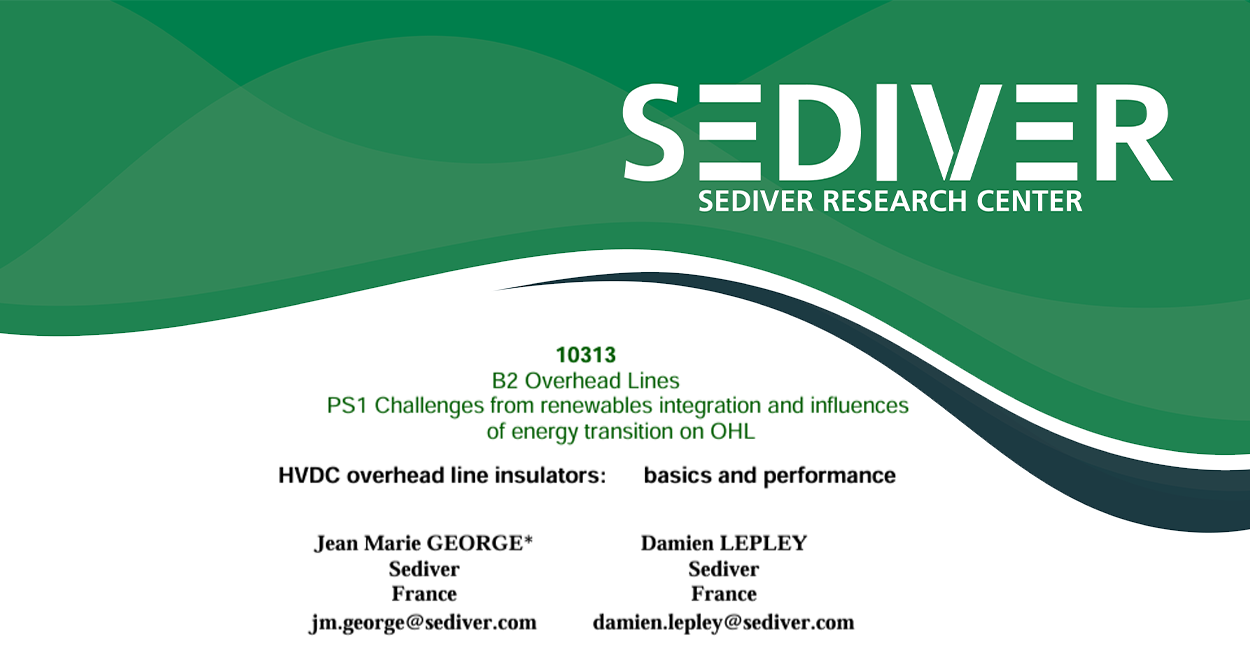Abstract:
The increase of energy demand and the progressive deeper impact of renewable energy in the global energy mix has triggered a strong interest in building new DC lines, upgrade older lines or convert AC to DC some existing segments taking advantage of existing rights of ways. This trend is consistent worldwide with projects going through a variety of environments and therefore with the need to design or adapt the insulation of the line with the most appropriate insulators.
IEC has established a long time ago a DC standard (IEC 61325) [1] which describes the technical requirements for DC overhead line insulators made of glass or porcelain dielectrics, but standardization bodies are still struggling with polymers for which some work is ongoing in CIGRE and IEC, often describing tests which are performed under AC stress and extrapolated to DC application, which by nature can be a challenge or seem inconsistent with the expected difference of performance when a DC voltage is applied. On the other hand, IEC 60815-4 [2] is a guide providing information related to the pollution performance and string design characteristics of insulators in DC stress conditions.
Several key aspects of DC insulator design will be re explained as it appears that some of the basics have been forgotten by some line engineers over the years. Among the main considerations some particularities of the end fittings and some geometrical aspects of the dielectric itself have been overlooked while relatively well described in the past and misapplications are possible today if these aspects are not clearly understood.
From a pollution point of view IEC 60815-4 [2] should be reviewed and the paper will present actual data to be compared with the theoretical approach described in the guide. The biggest gap between the mathematical model and reality is related to the calculation method of the USCD (Unified Specific Creepage distance) for a given pollution level. Consequently, strings will end up being longer with the model than needed resulting in possible higher costs of the towers.
A particular aspect of polluted insulators in DC in harsh environments is the benefit of a hydrophobic surface. For polymer insulators the ageing and erosion of the housing is a fundamental question for which there is no test today making consensus (ongoing work in CIGRE D1 72) [3]. For silicone coated glass or porcelain insulators the question is different given the absence of a fiberglass core which needs an absolute protection under the housing. Coating erosion and strength in DC has been evaluated especially for coated glass insulators and results will be presented.
Pollution performance in DC through artificial pollution tests with silicone coated insulators will also be discussed including the difficult aspect of producing an artificial heavy or very heavy layer. The transfer of hydrophobicity, which is the fundamental benefit of using hydrophobic surfaces for those thick layers can be a challenge in a laboratory and mostly the representativeness of the surface deposit when applied in one operation compared to the natural and progressive built up in service which will allow a progressive transfer over time.
To read more, please download the pdf of the technical paper
«Les informations recueillies à travers ce formulaire sont traitées par SEDIVER, société par actions simplifiée, inscrite au registre du commerce et des sociétés de Nanterre sous le numéro 542035761 et dont le siège social est situé 7/9 allée de l'Arche 92400 Courbevoie dans le but de permettre la téléchargement de nos documents de livre blanc et de vous envoyer des informations sur les sociétés et les produits de notre groupe La base juridique de ces activités de traitement est notre intérêt légitime à savoir qui accède et télécharge nos ressources et à leur envoyer une communication directe.
Les champs marqués d'un astérisque (*) sont des informations obligatoires. Si vous ne fournissez pas ces informations obligatoires, vous ne pourrez pas télécharger nos documents de livre blanc.
Vous disposez d'un droit d'accès, de rectification, d'effacement et de limitation en ce qui concerne le traitement de vos données personnelles ainsi que le droit de définir des directives concernant ce qu'il advient de vos données après votre décès et le droit de portabilité de vos données personnelles, au étendue applicable en vertu de la législation locale. Vous avez également le droit de vous opposer à la réception d'une communication marketing en cochant la case dédiée de ce formulaire, et à tout moment en cliquant sur le lien de désinscription placé dans toutes nos communications marketing.
Pour en savoir plus sur la manière dont nous traitons vos données personnelles et pour exercer vos droits, veuillez vous référer à la politique de confidentialité de l'UE du groupe SEVES et à la politique de confidentialité de SEDIVER.
Pour plus d'informations, veuillez consulter notre politique de confidentialité. "
 Français
Français

